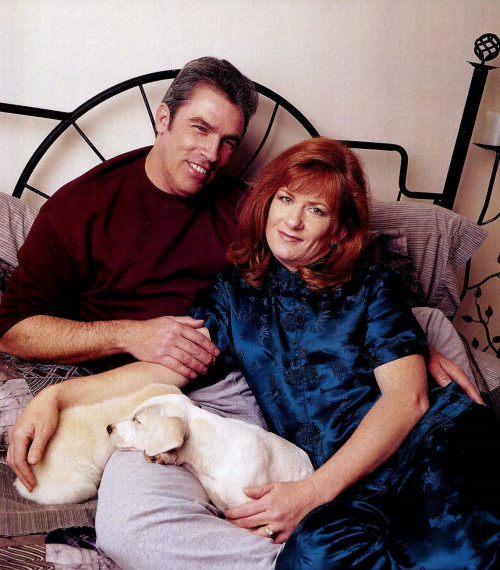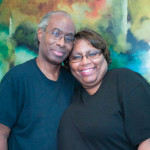So you’ve fallen all mushily, messily in love. Visions of carved initials on trees, Las Vegas wedding chapels, Thanksgiving with in-laws and baby-makes-three begin to run wild in your once-jaded imagination. The subject of your affections is sensitive, sexy, smart...and drives a 1963 Ford T-bird. You’re crazy about his friends, his taste in music, even the way he chews his food. Except for one little thing: Your real deal doesn’t have HIV. “Whoa! Issues city!” your support group chimes in alarm. Now, don’t stop in the name of love. Relationships are harder than the honeymoon would ever let on (sometimes HIV is the least of it), but they’re also the best medicine in the world. To help you two prepare for problems, POZ took some love lessons from couples who are making it work. So if your intended is wondering how to love an HIV positive partner, read on...
1. Let’s Talk About Sex
It’s date No. 3. You’ve turned out the lights, lit the candle. From the way Dreamboat’s kissing you, that tangle of thread you picked up at the Victoria’s Secret post-holiday sale is working. You’ve already disclosed your status, and he didn’t exactly turn tail and run. Now you’re both ready (and then some) to consummate. The hard part’s over, right?
Not quite. Your love-to-be doesn’t want to get HIV and you don’t want to give it to him, either. You may need to take two grownup steps backward to take one sizzling leap forward. “If HIV is the big pink elephant in the the room that’s not being talked about, it’s going to be a barrier to sexual intimacy,” says Michael Shernoff, a New York City therapist who has treated HIVers for 20 years. So don’t just fuck -- talk! (Or talk while fucking.) You need to negotiate acceptable and unacceptable risk behaviors, including the gray areas like oral sex. This deep communication won’t all happen overnight -- it’s a process you commit to, like safe sex itself, and it will force you to grapple with your differences and learn to compromise.
Take Michael, an HIV negative guy in Minneapolis, who only feels comfortable performing oral sex on his positive partner, Neal, with a condom. While Neal would rather not wear one, he is willing to accept Michael’s limits. But he laments, “There’s a power dynamic. At times I feel that Michael has the upper hand. He gets to decide what he’s comfortable with, and I have to go along with it.”
Sex is a two-way street -- it’s not only about a negative partner’s protection but about a positive hottie’s desirability and gratification, too. Unless you choose not to have sex (yeah, right), you can take the panic out of mixed-status pleasure by agreeing on what is and isn’t safe. And heat up the latex -- you can get titillatingly transgressive without ejaculation into orifices. POZ columnist River Huston, an HIVer in rural Pennsylvania, found this out with her HIV negative boyfriend. “He just loves being experimental,” River says. “All we do is go and buy sex toys -- ’What do you think of this? Can we try that?’ It’s like the great sex adventure.”
If you do “slip up” and risk transmission, challenge yourselves to understand why, says Robert Remien, a clinical psychologist at the New York State Psychiatric Institute. “Taking unwanted sexual risks can be an attempt to prove one’s love or express anger at the virus,” he says. “Making these painful feelings explicit diffuses their power.” Discuss how you would feel if the negative partner did seroconvert. Is there a part of you that actually desires that? Then do a reality check about all the ways AIDS really sucks.
Of course, if you’re both positive, the prospect of dispensing with condoms may, ahem, arise. Even this can be risky -- consider reinfection. “There are a lot of same-status couples who make the decision to forego condoms and say, ’We’re both infected, and we know about multidrug resistant strains, but we want that intimacy,’” Michael Shernoff observes.
Tye and Glen, healthy but with low CD4 counts, agreed to chuck condoms. “We talked about it,” Tye says, “and we decided not to worry about reinfection. It made a big difference for us. It made us feel closer.” But Glen admits that the thrill of glove-free loving is hardly what keeps them together. “If you really love the person, it doesn’t matter if there’s a condom or not,” he says.
2. No Halos in your size
Note to neggies: Love her, sex her, listen to her. Your presence can make all the difference in your positive partner’s quality of life. But just because your honey has HIV doesn’t mean you have to be her savior, sycophant or babysitter. Yes, you may want to hold her hand while she waits for her CD4 count or to bring her breakfast in bed when she’s sidelined by drug side effects. But does she want you to? However hitched to your hip, she’ll always need a certain amount of autonomy, independence and power -- and this includes the power to give as well as receive.
Dale and Steve, who live in Little Rock, know this firsthand. They began as a mixed-status couple 13 years ago, but shortly into the relationship, Dale seroconverted -- and was shocked to feel relief. “Prior to becoming infected I was much more of a caregiver, always needing to support Steve,” he says. “When I finally tested positive, I began to look for his support in return. The outcome is, we have bonded on a level that I think a lot of people don’t have the privilege to.”
Finding the balance between mothering and smothering requires that you each do a lot of listening -- and a little letting go. Chances are Pozzie isn’t looking to play the sick, needy supporting role to Harriet’s star turn as health. Such an arrangement can be a way of not dealing with your actual differences -- and the difficulties and disappointments they cause. “Accept the reality that your serostatus is ’opposite,’ and talk about what a ’positive’ and a ’negative’ identity mean to you,” Remien says. “Neither experience is more legitimate. Both deserve respect.”
River Huston recalls an old flame who tried to look after her 24/7. “It was always about me,” she recalls with a groan. “Everything was catered to my needs. There was no balance.” River was often left wondering what was wrong with this long-suffering superguy. “It seemed like, ’You’re not special enough to have it be about you.’ That’s not the way I wanted it.”
3. Do Ya Think I’m Sexy?
For a positive paramour, the 3 a.m. worry is less “Will You Still Need Me When I’m 64?” than “Will You Still Love Me Tomorrow?” -- when diarrhea, fatigue or lipodystrophy strikes. These lovelies are hardly the recipe for romance. “Everyone just feels less sexy if they’re not feeling well,” Remien says. “Having HIV can make you feel like damaged goods, and having symptoms only makes it worse.”
For Los Angelenos Tye and Glen, both HIV positive for nearly 10 years and together for two years, this “damaged goods” syndrome has frozen their once-flaming sex life. Tye doesn’t feel like his foxy old self, thanks to his significant -- and visible -- weight loss. “I look in the mirror and see this really skinny person,” he says. “But I think Glen sees it differently than I do.” Tye’s right -- his boyfriend sees him. “I still think he’s hot,” Glen says. “I’ve tried to encourage Tye that he still looks good.” If you’re having a diseased-pariah moment, you probably need an all-important second opinion on your sex appeal. Ask the expert -- your partner. You may be surprised. Some people find the marks of this disease as sexy as battle scars.
And take some of the pressure off your sex life. Sex is important, but it’s just one of many spices in the dish of love. All long-term couples go through erotic ebbs and physical fallout -- that’s what those “for better or worse,” “in sickness and in health” vows mean. Often, lackluster sex is less a symptom of reduced desire than of larger quality-of-life issues such as overwork. Find time to play with each other. Date again. Need romance? Make out in a movie. Need exercise? Be gym buddies. Or try something new and out of the blue: bird watching...bungee jumping...just do it! As for what goes down in bed, repeat after us: The most important sex organ is between your ears.
“Share with each other everything that has meaning in your lives,” Remien says. “That is the foundation for true intimacy.”
4. Twin Piques
You’re gagging down HAART by the handful; she thinks AIDS pills are poison. She hasn’t seen the inside of a doctor’s office in months; you’re ready to pitch a tent in yours. Could you be feeling...jealous? The green-eyed monster will rear its ugly head in a mixed-status relationship, but when you’re both positive -- in different stages of disease, say, or with conflicting treatment philosophies -- it can cause serious friction.
Take a deep breath, turn down the volume. Where did you get the idea that everybody’s tale of -- and take on -- life with HIV is the same? Sharing the same bug doesn’t erase all the other differences, and sometimes it creates more.
Consider Steve and Dale. Both are healthy, but there’s a vast discrepancy in the quality of their medical care. As an army vet, Dale qualifies for services through the Veteran’s Administration, a system Steve finds streamlined and effective compared to his own University of Arkansas hospital system. “I have to jump through the flaming hoops of hell to get service. I’m jealous of Dale’s health care,” Steve says. What keeps him from stewing in resentment? Dale gladly jumps through those flaming hoops right alongside Steve to show support -- two against the System. That’s what boyfriends are for.
In the case of Tye and Glen, the differences in their experience of HIV run deeper. As Tye’s health has gotten worse, his sex drive has plummeted, while Glen’s remains robust. “I haven’t really confronted him about why the sex has been minimal,” Glen says. “I know that sometimes -- with his illness and the medications -- he’s not in the mood. I’ve learned to accept that.”
Acceptance and agreement, communication and compromise -- these are the emotional muscles that a relationship pumps up. And even though you know you are not alone in dealing with these challenges -- virus or no, everyone has to work at it every day -- a mixed-status or positive couple can often feel as if it’s the only one in the world. If you need help, find a professional couple counselor who has HIV experience. Break the silence with family and friends. Demand that your community acknowledge your existence.
5. Don’t Stop Thinking About Tomorrow
Everyone hopes that down the years they’ll be sitting on a porch in matching rockers, going gray together, finishing each other’s sentences and dangling grandkids on the knee. But despite all the recent and still-to-come medical breakthroughs, many HIVers -- and their partners -- just can’t quite let themselves believe in a long life. “Even when doctors say, ’Hey, you’re likely to die of a heart attack in normal old age,’ people still doubt it,” Remien says. “There’s this sense that one of them is likely to get sick sooner or be disabled earlier. It’s that fear of ’What’s down the road for us?’”
But HIV negative Vassily, who lives in Seattle with Melissa, his positive girlfriend of two years, doesn’t buy any of that doom-and-gloom stuff. “If you’re going to think like that, you should probably think that way whether you’re HIV positive or not,” he says. “Because the old cliché about getting hit by a bus is true.”
So here’s a prescription for balance in these bewildering times: Live for today and plan for tomorrow. Take that vacation in Mexico you’ve always dreamed about, wine and dine at that four-star French restaurant, and sock some money in a retirement account for those matching rockers. In the end, happily ever after with a positive honey means not letting HIV define your lust, your love or your life.

Kathy Petersen, 35, HIV positive, Los Angeles; Ronny Critcher, 46, HIV positive, BostonLisa Cohen
THE LONG-DISTANCE LOVERS
Kathy Petersen, 35, HIV positive, Los Angeles; Ronny Critcher, 46, HIV positive, Boston
"I was definitely not looking,“ Petersen says of the positive-hetero trip to Jamaica. But the second night at the resort when the group dined together, she spotted Critcher. ”I asked my friend, ’Who is that?’"
Their Hookup: A Jamaican getaway for straight, positive singles organized by Positive Connections (www.positiveconnections.com).
Quality Time: Petersen, a program manager for the state of California and mother of two (her husband died of AIDS in 1997) and Critcher, a chef and divorcé with one daughter, have been together for four months.
Days of Solitude: Critcher found out he was positive in 1994. “I decided I would just be alone, so I was single for seven years.” Tired of feeling isolated, he found Positive Connections while surfing the Net and went on the Jamaica trip to make other straight, positive friends. “I was a little nervous,” he admits. “I didn’t know what to expect.” Petersen had done the Caribbean cruise the year before -- when she was already spoken for, with a partner who was also positive. But on her sophomore voyage, she was coming out of a bad breakup. “I went on the trip to see friends, to get away,” she says. "I was definitely not looking."
One Enchanted Evening: The second night at the resort, when the entire Positive Connections group dined together, Critcher and Petersen spotted each other. “She was sexy, walking into the restaurant with this great smile and a pretty blue dress,” he recalls. Petersen says she “looked over at him and kind of got a shock, an electric shock. I asked my friend, ’Who is that?’” Although she sat at Critcher’s table, there was someone sitting between them. “So we didn’t get a chance to talk at dinner,” he says. “I didn’t want to -- I was shy -- but I thought about her that whole night.”
First Base: The next day, the group toured the spectacular 600-foot cascades of Dunn’s River Falls, near Ocho Rios. When Petersen saw Critcher on the boat, “my heart did a little happy dance.”
Getting to Know You: That night, the two partied on the dance floor. “After that, we were together all the time, from morning until night,” Critcher says. “We did a lot of talking -- about our lives, her kids, my daughter. I didn’t want the week to end.”
Worth Writing Home About: “He said, ’Whatever your life is, that’s what I want to be a part of,’” Petersen recalls. “It blew me away.”
The Glitch: The two live on opposite coasts. But once home, they spoke on the phone each night for two hours and began taking turns catching transcontinental flights. Now the pair has marriage in mind, and Critcher is planning a move. “No matter where she’s at, that’s where I’m going to go.”
Double Happiness: Both are in good health, and Petersen says HIV factors in their relationship “parenthetically.” Still, for both, having a positive partner is a plus. “We can talk about anything -- anything I think, anything I feel,” says Petersen. “I have that feeling that nothing has to be handled alone anymore. We’re doing everything as a team. Our future is together. It just makes me so happy.”

Michael Tarvin, 41, HIV positive, San Diego; Charles Riesen, 37, HIV positive,m SLarry Ashton
THE AMOROUS ACCOUNTANTS
Michael Tarvin, 41, HIV positive, San Diego; Charles Riesen, 37, HIV positive, San Diego
Although it took Riesen a week to get up the courage, he responded to Tarvin’s online ad. “He was an accountant, like me. About my height. Not into the bar scene. And I liked his shaved head.”
The Lead: Via e-mail after browsing personal ads at Positive Personals (www.positivepersonals.com).
Point of Sale: July 2001
The Prospectus: Riesen says it was his roommate who hooked him on to Positive Personals. “I was a little skeptical at first,” says the online classifieds newbie. “I was used to meeting people face to face.”
The Balance Sheet: Although it took him a week to get up the courage, Tarvin’s ad made Riesen click on the “Respond to Ad” button: “He was about my height and an accountant, just like I am. Not into the bar scene. And I liked his shaved head.” Tarvin, who had placed ads in the past, hadn’t found them helpful for much more than casual encounters. But he liked Riesen’s e-mail -- it was short and to the point (to this day, Tarvin carries it in his wallet). “When I saw Charles’ photo, I thought he didn’t mean to e-mail me, he must have gotten the wrong person,” he confesses. “He was so cute.”
The Due Diligence: “We talked on the phone for, like, 45 minutes -- about personal stuff, where we were from, what we liked to do,” Riesen says. “I was pretty excited to meet him. He seemed like just what I was looking for: stable, honest.”
Closing the Deal: Dinner at a Greek restaurant. “I had the first-date jitters, but he was very easy to talk to,” Tarvin recalls. “We talked about everything: likes, dislikes, what we did, who we are. It blew me away. It came out so naturally.”
Expansion Plans: “After that first date, we saw each other every day,” Tarvin says. Three and a half months later, they moved in together, and in December, the pair visited each other’s families for the first time. Now the two are thinking of moving to Austin, to be closer to the Tarvin clan. “I understand him better after meeting his mom, where he got his values,” Riesen says. “With my family, it was like he’d been with us a long time.”
Added Value: Seroconcordance. “I’ve dated people that aren’t positive,” says Riesen, who was diagnosed in 1984 and whose two long-term partners before Tarvin were both positive. “It makes it a little more difficult. You’re more concerned with things you shouldn’t do -- you don’t want to infect them. It’s kind of awkward.” Tarvin, who tested positive in 1985, agrees. “The fact that Charles is also positive makes things easier for me when I have my bad days or go to a lot of doctors. He can understand that. There’s not a fear of saying, ’I hurt today’ or ’I’m tired today.’ We take care of each other.”
Liabilities: “He doesn’t roll up the toothpaste the way I do,” Riesen says.
Bonus Clause: “What I love most about Charles is his smile,” Tarvin says. “He’s so caring. Like my mom says, ’You look at his eyes, and you can see it.’”

Robert Olufs, 40, HIV positive, Los Angeles; Cathy Olufs, 37, HIV positive, Los AngelesTed Soqui
THE ANNIVERSARY CLUB
Robert Olufs, 40, HIV positive, Los Angeles; Cathy Olufs, 37, HIV positive, Los Angeles
“We live our lives as if we don’t have HIV,” Cathy says. “Much of our lives are just like everybody else’s. We get up and go to work. Deal with children. Plan for the future. We want to buy a house.”
Wooing Since: March 2000
Wedded: March 2001
Love Walked In: At a support group for HIV positive heteros sponsored by Being Alive. “It was the first one I’d been to in LA,” says Robert, a New Mexico transplant and divorced father of two. Since testing positive in 1987, the electronics technician had dated very little, and lost his longest-term partner during that time -- their relationship lasted from 1994 to 1997 -- in a car accident.
No Place Like Home: Cathy was facilitating the support group for the first time when, she says, “This guy walks in, tall and handsome, like a movie star, and my mouth dropped to my chest.” Positive since 1995, Cathy had checked out the websites for straight, positive singles and had gone on a cruise. “I had been looking,” she recalls. “And then he fell into my lap.”
Opportunity Rocks: “I thought there was no way that she could be single,” Robert says. “She was this little, pretty redhead.” As it turned out, Cathy was going with a friend to see a band play at the Key Club in West Hollywood, and the friend bowed out. “So after the group was over, I pulled Robert aside and asked him to go with me.” Robert leapt at the chance. “I thought, Wow, that’s pretty neat just to happen like that,” he says. “I called my son to let him know I’d be late.”
Love at First Bite: Cathy knew that the romance had sealed for her a few weeks after they met -- on the Superman ride at Disneyland’s Magic Mountain. “There’s black light in the waiting area. I looked at him, and under the light, his four bottom teeth were stark white. I said, ’Have you had some dental work done?’ He said, ’I have to tell you, I have a partial.’ I almost fell on the floor laughing because I have one, too. I popped mine out. We laughed. I knew this guy was for me. He’s perfect, but not too perfect.”
Her Assets for Him: “She’s giving, loving, trustworthy,” Robert says without missing a beat.
His Plusses for Her: He cracks corny jokes and cries at sad movies. “At the same time, he’s a very macho man,” she says. “He’s been through struggles but hasn’t become really hardened by all of that.”
He Says: “We know we might expire from this life sooner than other people. We have to look at that, but we don’t want to dwell. We make long-term plans, and we do things we can’t afford sometimes because they make us happy. In a way we’re lucky. It’s probably the way people should live anyway.”
She Says: “We live our lives as if we don’t have HIV. Even though it is so deeply intertwined in the essence of us. But much of our lives are just like everybody else’s. We get up and go to work. Deal with teenage children. Plan for the future. We want to buy a house.”







Comments
Comments